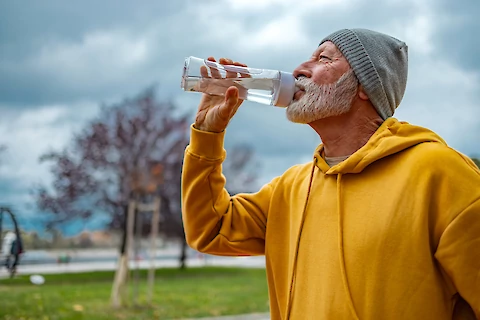
As winter approaches, hydration is one health consideration often overlooked during this colder season. Despite the chilly weather, dehydration remains a serious risk for seniors. This is mainly due to physiological changes as we age, such as a diminished sense of thirst. Let's dive into this vital issue, debunking common myths, offering practical hydration tips, and explaining how to recognize signs of dehydration in seniors. Start this essential winter wellness journey with Senior Helpers Princeton.
Understanding Dehydration in Seniors
Seniors are often more susceptible to dehydration. As we age, our bodies' ability to conserve water is reduced, and our thirst sense becomes less acute. These issues, coupled with changes in the body due to medications or underlying conditions, can increase the risk of dehydration. Even though you may think dehydration is a concern only during summer, keeping fluid levels balanced in the winter is just as critical. Our internal body processes and the dry winter air can lead to fluid loss, making hydration a must, regardless of what the thermometer says.
Debunking Hydration Myths
People often misunderstand hydration, especially during the winter months. Many people believe that hydration is less important in colder weather, thinking that we only need to drink more water when we are perspiring heavily during hot days. This is a dangerous misconception. Your body needs a constant water supply to aid digestion, regulate body temperature, and keep your skin healthy, among other things, regardless of the season or temperature.
Another common myth is the belief that only drinking water can keep us hydrated. While water plays a significant role in hydration, other fluids and certain foods can also contribute to maintaining fluid balance.
Lastly, it's crucial to understand that you're still losing water even if you're not visibly sweating. Breathing, urinating, and sleeping contribute to fluid loss, necessitating regular replenishment.
Practical Hydration Tips for Seniors
Maintaining proper hydration involves more than just drinking water. Encourage seniors to incorporate a variety of fluids into their daily routines, such as fruit juices or warm decaf teas, making the process more enjoyable and less monotonous. Foods high in water content, such as cucumbers, oranges, and watermelons, can also contribute to hydration.
Creating a routine can be helpful. Set reminders to drink water or herbal tea at the top of each hour. Always carry a water bottle when leaving the house, and consider sipping on a drink while reading or watching TV. These little measures can add up and significantly help to maintain fluid balance.
Recognizing Dehydration in Seniors
Knowing how to recognize the signs of dehydration is crucial. Symptoms include:
- Dry or sticky mouth
- Decreased or dark-colored urine
- Fatigue
- Dizziness
- Confusion
In seniors, these symptoms may be more subtle and easily overlooked. If you suspect someone may be dehydrated, encourage them to drink fluids and seek medical attention if necessary.
Need Help With Hydration?
Remember, even during the winter, hydration still needs to sit high on our list of health priorities. By debunking common myths and understanding how to incorporate more fluids into our daily routines, we can help our seniors maintain their health and well-being throughout winter.
At Senior Helpers Princeton, we provide the highest standard of care for seniors in our community. If you live in Princeton, Hopewell, or Lawrenceville and need professional assistance for a loved one, don't hesitate to contact us. We're here to help!